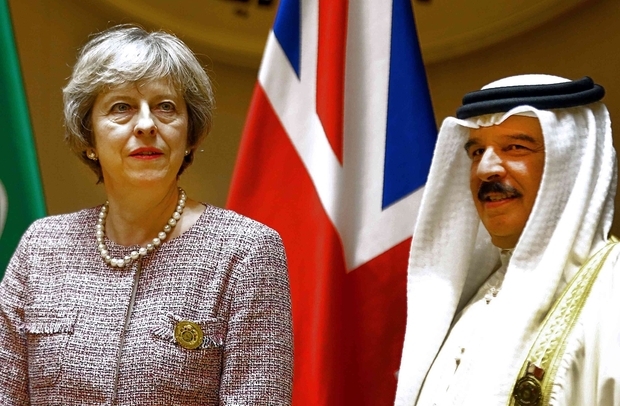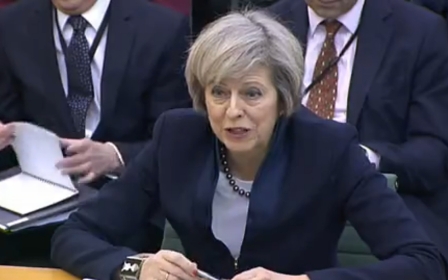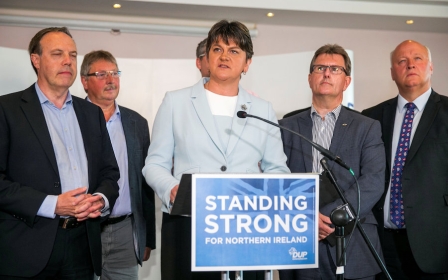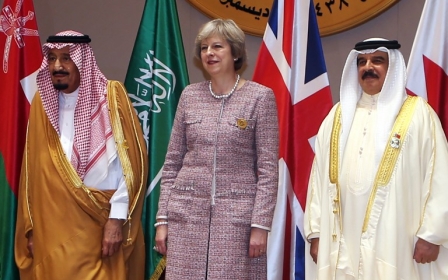ANALYSIS: UK trading 'soft power' for hard cash in post-Brexit arms deals with Gulf
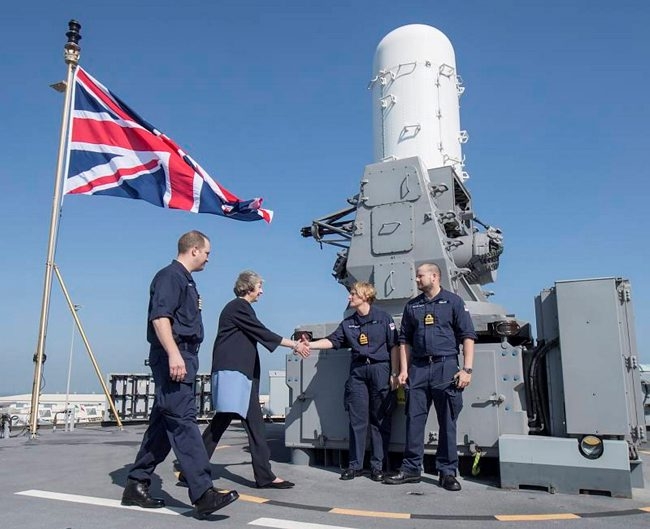
LONDON - British influence in the Middle East will decline dramatically after Brexit as the UK trades its substantial "soft power" for hard cash from defence deals and arms sales with "authoritarian regimes", according to analysts, campaigners and opposition politicians.
With only a year left until the UK's official moment of departure from the European Union, a string of academics, policy experts and opposition politicians have told Middle East Eye that Theresa May's approach to Brexit is likely to weaken the UK's diplomatic standing.
In a series of interviews, they said that the UK government's "flippant" approach to trade and security discussions is leading to a "desperate" rush to sell arms and financial services to Gulf states including Saudi Arabia, Bahrain and UAE.
The prime minister embarked on a tour of England, Scotland, Wales and Northern Ireland on Wednesday, when she pledged to keep the UK "strong and united" after Brexit.
But the government has just a few months left to strike a deal on the future UK-EU relationship, which will have major economic and security ramifications for UK interests in the Gulf and trade with the wider Middle East.
The region is key to the UK's energy security, and the UAE and Saudi Arabia are the UK's largest export markets in the Middle East worth around £20bn ($28bn) a year according to government figures. But these levels of trade are far below UK trade with the EU.
Other experts and Brexit-supporting backbench Conservatives told MEE the impact of leaving the EU on relationships in the Middle East would "vary from country to country" or offer new "opportunities for trade".
'A red, white and blue Brexit'
UK ambition in the region remains high, and five months after the referendum vote May travelled to the Gulf and coined the new slogan of "a red, white and blue Brexit", announcing that the UK would seek to strike trade deals with Gulf countries.
Addressing 300 British troops on the deck of the now decommissioned Royal Navy helicopter carrier, HMS Ocean, in Bahrain's Khalifa Bin Salman Port, the prime minister said in December 2016 that she was talking to Gulf leaders about the "opportunities for trade" and security.
She said: "As Britain steps up to forge a new, positive, confident role for our country on the global stage, the Royal Navy will be an important part of our vision – pursuing our objectives of security on land and at sea, and helping to ensure the free flow of international trade."
Now, nearly 18 months later, the UK is only a year away from formally leaving the EU and entering a 21-month transition period, before the final permanent post-membership relationship is implemented.
And, critics say, the rush to Brexit is leading the government to make "compromising" deals with authoritarian states in the region.
The Tories are making compromising decisions with regimes like Saudi Arabia
- Vince Cable, Lib Dem leader
"I've always been in favour of developing good trade relations with emerging powers ... The problem with Brexit is that it has made the Conservatives desperate to get signs of potential deals, which is why they are making compromising decisions with regimes like Saudi Arabia when we would usually tread carefully," Vince Cable, the leader of the Liberal Democrats, told MEE.
Cable's concerns are shared by leading anti-Brexit campaign group Best for Britain. Lord Mark Malloch-Brown, the chairman of the group and a former UN deputy secretary-general and Foreign Office minister, told MEE: "Since Britain was replaced by the US as the major Western power east of Suez, UK diplomacy has always been a useful default backup when the US is distracted.
"Now when an erratic administration in Washington is creating turmoil among its Middle Eastern allies, there is no British fallback. Its diplomacy is consumed by its failing Brexit negotiations and it has sacrificed any principled position in the region in a desperate effort to sell arms and financial services to make up for a post-Brexit trade gap."
Richard Corbett, the leader of Labour's MEPs in Brussels, added that Conservative claims of future trading relations with the rest of the world were often "flippant or meaningliness" and cited May's Bahrain speech as evidence that she is failing to "get to grips with reality".
He added that it was "frankly disgusting" that trade deals with Saudi Arabia and other "regimes" were being pushed to compensate for a downturn in trade with the EU. "Brexit is not going well and she will be desperate to graph a trade deal and will make any concession," he said.
However, Crispin Blunt, an influential backbench Conservative MP, told MEE the prime minister's reception in Bahrain "was a good indicator of how an independent trading UK will be well placed to not only secure a trade deal, which is not on the cards with the EU, but build on our already strong Gulf position. The kinds of deals secured during MBS's [Saudi Crown Prince Mohammed Bin Salman] visit to London also shows opportunity available to UK."
The decline of soft power
The government has also been accused of having "progressively less to say to Gulf leaders" in recent years, other than to ask them to buy more British goods, primarily arms.
Fresh trade discussions with the Middle East, which is being run by a new trade group in Whitehall, come as the twin pillars of UK foreign policy - a close partnership with Europe via the EU and close ties with the US - are already weakened, if not falling away.
The coordinated international response to the Salisbury poisoning incident has helped repair some damage, but two recent foreign policy stumbles in the Middle East have demonstrated how Britain's role in the world is vague and influence waning, say experts.
First, Foreign Secretary Boris Johnson made a disastrous gaffe over Nazanin Zaghari-Ratcliffe, a British-Iranian citizen arrested and detained while holidaying in Iran. His remarks that she was "simply teaching people journalism" in Iran is denied by her employers and were noted by Iranian authorities and may result in a longer prison sentence.
Second, it also emerged last year that Priti Patel, then international development secretary, held a secret meeting with Benjamin Netanyahu, the Israeli prime minister, while on private holiday in Israel in August 2017. She was forced to resign for her foreign policy freelancing, and both incidents added to a feeling that May's team is not competent when it comes to the Middle East.
The government's response and plan for the Middle East post-Brexit is to push the concept of Global Britain, a vision for a "secure and prosperous United Kingdom, with global reach and influence".
Speaking at the Lord Mayor's Easter Banquet on Wednesday, Foreign Secretary Boris Johnson stressed the UK's defence and security contribution to the EU and influence in the Middle East, highlighting the UK's proportion of overall defence and aid spending.
Johnson said Britain was with Europe in the Middle East and the Sahel in the "fight against Daesh", while the recently published National Security Capability Review also noted the role expected to be played by Global Britain and efforts to "strengthen the UK's overseas network" and use "soft power" to advance our interests.
But Peter Millett, a former senior UK diplomat, told MEE that while the impact of Brexit on the Middle East would "vary from one country to another", the concept of Global Britain risked becoming an "empty slogan unless there is proper funding behind it".
Millett, who retired as ambassador to Libya earlier this year, told MEE: "For countries where the UK has a deep history, such as Jordan, Libya and the Gulf, Brexit won't make that much of a difference.
"But across the board it will make a difference, as speaking as a member of the largest trade block in the world means we can back up our political message with a powerful economic message. We will lose this."
He cited the example of his assistance budget as ambassador in Libya, which was $17m a year compared to the $123m EU budget for the country.
Millett's view on the role play by defence post-Brexit is supported by Luigi Scazzieri, a research fellow at the Centre for European Reform. He told MEE that the impact of Brexit on UK influence in the Middle East would "depend on keeping up its defence spending" as its soft power inevitably decreases.
'Bullish about Britain'
Saudi Arabia is pushing for a stronger defence relationship with the UK and the country's foreign minister, Adel al-Jubeir, used the recent visit by Saudi Crown Prince Mohammed bin Salman to say that Riyadh was "bullish about Britain".
That visit saw bin Salman move closer to confirming a deal with defence giant BAE Systems to buy 48 Typhoon fighter jets, alongside a commitment to push forward around $100bn in other export and service deals.
"The early signs suggest that the Brexit vision this government is following is one that will make the UK even more dependent on arms sales and cosy relationships with dictators and human right abusers," said Andrew Smith, of the Campaign Against Arms Trade.
"All the polling suggests that the vast majority of us, whether we voted Leave or Remain, oppose these arms sales.
"Whatever people's views on the UK's constitutional future, this is not the Brexit people voted for.
"Like the Turkey visit May made last year, the recent Saudi crown prince's time in London showed how low Downing Street will sink to win favour with authoritarian regimes."
Militarily the UK's departure from the EU is unlikely to see a weakening of relations, said Peter Roberts, the director of military sciences at the influential Royal United Services Institute.
"Political ambitions remain high [in the UK] and I think the UK's future will remain intertwined with the Gulf. There is a shared history and energy security, which the UK is hugely reliant on.
"I don't see any change in term of permanent basing, rotation of forces or exercises either. The Gulf is one of the highest priority areas for the government."
The Department for Exiting the European Union did not respond to a request for comment.
New MEE newsletter: Jerusalem Dispatch
Sign up to get the latest insights and analysis on Israel-Palestine, alongside Turkey Unpacked and other MEE newsletters
Middle East Eye delivers independent and unrivalled coverage and analysis of the Middle East, North Africa and beyond. To learn more about republishing this content and the associated fees, please fill out this form. More about MEE can be found here.


